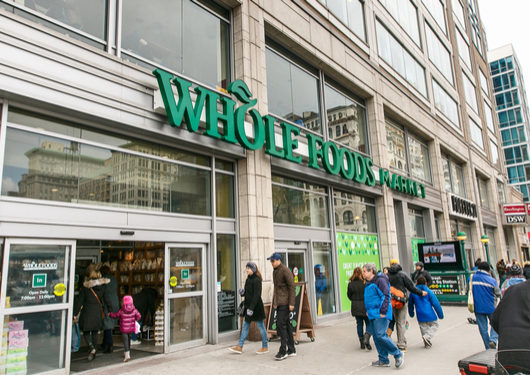
Home » How Amazon Is Using Whole Foods in a Bid for Total Retail Domination
How Amazon Is Using Whole Foods in a Bid for Total Retail Domination

June 6, 2018
Amazon had been militant about leaks during the seven weeks that the two companies had been in negotiations, and the vast majority of those working inside the building had been unaware that the deal was afoot.
Now they were meeting their new overlords for the first time. Whole Foods CEO John Mackey introduced Jeff Wilke of Amazon, who had flown in for the gathering. Wilke, the e-commerce giant’s CEO of Worldwide Consumer, decided to play to his foodie audience.
“I wanted to tell you just a little bit about how Whole Foods changed my life as a start,” he said. “As I was sitting this morning, eating breakfast, watching the sun rise over this beautiful city — by the way, quinoa, blueberry, and some other vegetables…”
That’s when Mackey, a vegan who avoids refined foods and travels with a rice cooker, lightheartedly corrected him. “Those aren’t vegetables,” he said. “That’s okay. We’re learning.”
In that moment, it was clear why Wilke and his team needed Whole Foods. His comment may have been just a slip of the tongue, but it reflected a persistent issue for the company: Amazon has expertise in many areas, but food is not one of them. For a decade, Amazon — a company with $178bn in revenue and seemingly limitless resources — had not come close to breaking the billion-dollar sales mark in its fresh food operation.
RELATED CONTENT
RELATED VIDEOS
KEYWORDS Business Strategy Alignment consumer packaged goods E-Commerce/Omni-Channel Food and Beverage Global Logistics Global Supply Chain Management Retail SC Finance & Revenue Management SC Planning & Optimization Sourcing/Procurement/SCM Supply Chain Analysis & Consulting Technology
Related Directories
Subscribe to our Daily Newsletter!
Timely, incisive articles delivered directly to your inbox.
Popular Stories

2024 Supply Chain Management Resource Guide: There's Only One Way Off a Burning Platform
VIEW THE LATEST ISSUECase Studies
-
Recycled Tagging Fasteners: Small Changes Make a Big Impact
-

Enhancing High-Value Electronics Shipment Security with Tive's Real-Time Tracking
-

Moving Robots Site-to-Site
-
JLL Finds Perfect Warehouse Location, Leading to $15M Grant for Startup
-
Robots Speed Fulfillment to Help Apparel Company Scale for Growth



